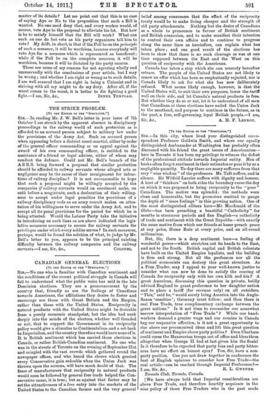THE STRIKE PROBLEM.
[To THE EDITOR Or THE "SPECTATOR."] Sink—In reading Mr. J. W. Bell's letter in your issue of 7th October I am struck by the apparent absence in disciplinary proceedings in the railway world of such protection as is afforded to an accused person subject to military law under the provisions of the Army Act. Such an accused person when appearing before a district court-martial, either by order of the general officer commanding or on appeal against the award of his own commanding officer, is entitled to the assistance of a friend or legal adviser, either of whom may conduct the defence. Could not Mr. Bell's branch of the A.S R.S. bring forward a proposal that similar protection should be afforded to railway servants whose alleged acts or negligence may be the cause of their arraignment for infrac- tions of railway discipline ? It is not unreasonable to hope that such a proposal might be willingly accepted by the companies if railway servants would on enrolment make, on oath before a magistrate, such a declaration of their willing- ness to accept under legal penalties the provisions of a railway disciplinary code as an army recruit makes on attes- tation of his willingness to serve under the Army Act, and to accept all its penal provisions for the period for which he is being attested. Would the Labour Party take the initiative in introducing on such lines as are above indicated the legis- lative measures necessary to secure for railway servants the privileges under which every soldier serves ? In such measures, perhaps, would be found the solution of what, to judge by Mr. Bell's letter to you, appears to be the principal existing difficulty between the railway companies and the railway


















































 Previous page
Previous page